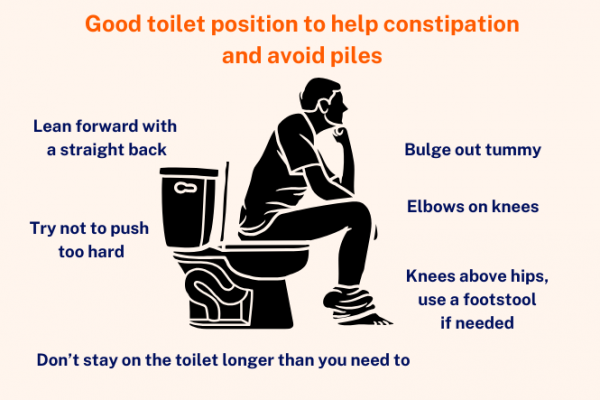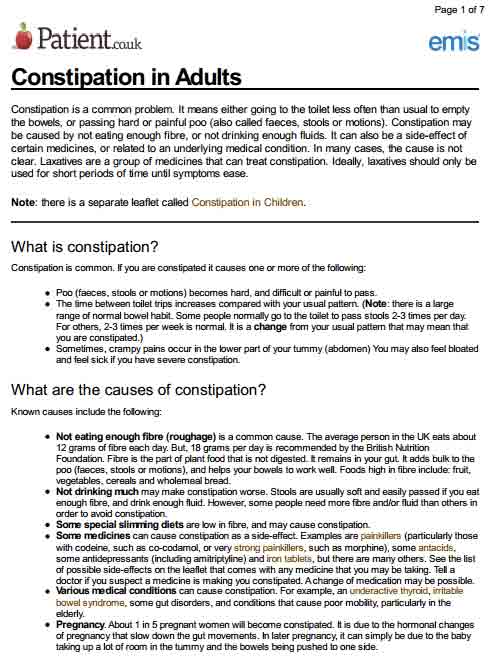Constipation in adults | Mate tūtae kore
Key points about constipation
- Constipation (mate tūtae kore) is when your bowel motions (poo, stool or faeces) become hard and lumpy, making them painful or difficult to get out. It's also when you pass bowel motions less often than usual.
- It's a common problem and is more common in older adults, people who are immobile, or people who have a diet that doesn't contain enough fibre.
- Usually, constipation lasts a short time and isn't serious.
- For some people, it causes ongoing discomfort and may need proper assessment by your healthcare provider.
- If you have a child with constipation, see our page on constipation in children.

These things can all cause constipation:
- Not enough fibre in your diet.
- Not drinking enough water.
- Not moving around enough.
- Not going to the toilet when your body tells you it’s time to go.
- Medical problems, eg, an underactive thyroid, irritable bowel syndrome or spinal cord problems.
- Pregnancy.
- Weight loss diets that are low in fibre – often high protein diets.
- Overuse of laxatives.
- Medicines:
- codeine, panadeine or tramadol for pain.
- amitriptyline or nortriptyline used for chronic pain, sleep or depression
- antacids containing aluminium
- iron and calcium supplements
- diuretics, eg, indapamide and bendroflumethiazide for high blood pressure
- calcium channel blockers, eg, amlodipine, felodipine and diltiazem used for high blood pressure.
Most people have bowel motions somewhere between 3 times a week and 3 times a day. Constipation can be:
- fewer bowel motions than usual
- hard or lumpy bowel motions
- difficulty passing bowel motions or straining
- gas, wind, bloating or stomach cramps and discomfort
- the feeling of being unable to completely empty your bowel
- the feeling that there's something blocking your bowel.
The 2 most important things you can do to ease or prevent constipation are to be as active as possible and to make sure your diet contains plenty of fibre and fluid.
Exercise
- Regular exercise helps strengthen your lower colon muscles and promotes normal muscle contractions in your bowel wall.
- You should aim to be active for a minimum of 30 minutes every day.
Fibre and fluids
- These help to bulk out and soften bowel motions by trapping water. This also helps to keep your bowel motions moving along.
- Fibre can come from a range of foods, eg, vegetables, fruits, wholegrain breads and cereals.
- As a guide, men should eat at least 30 grams of fibre a day, and women about 25 grams a day, although there is no upper limit.
- You need to drink at least 1.5 litres of fluid – ideally water – every day, unless you're an older person and your healthcare provider advises differently.
Natural laxatives
A laxative is any food or medicine that helps you pass a bowel movement. Some foods have a natural laxative effect and eating them can help relieve constipation.
- Kiwifruit contains an enzyme which helps with constipation for many people. Eat 2 kiwifruit a day when they're in season, or kiwifruit juice or Kiwicrush when they're not. Green kiwifruit work better than gold.
- Bran isn't broken down in your digestive system and is able to hold water as it moves through your bowel.
- Many fruits and dried fruits contain high levels of sorbitol and can act as natural laxatives. These include apples, apricots, grapes (and raisins), peaches, pears, plums (and prunes), raspberries and strawberries.
Going to the toilet
When your bowel motion arrives in your rectum (the lowest part of your bowel), your body sends a signal that it's time to go to the toilet. If you decide you're too busy, the bowel motion sits there getting drier and drier and you'll need to strain more to pass it. Your bowel works much better if you listen to the signal and go to the toilet as soon as you can.
You can use your body position on the toilet to help.
 Image credit: Healthify He Puna Waiora
Image credit: Healthify He Puna Waiora
Apps reviewed by Healthify
You may find it useful to look at some Digestive health apps and Nutrition, exercise and weight management apps.
Medicines used to treat constipation are called laxatives. Treatment with a laxative is needed only if the self-care described above doesn't work well. The types of laxatives differ in how quickly they start working, how helpful they are in different situations, possible side effects, their taste and their cost. Your healthcare provider or pharmacist will advise you on a suitable laxative for your needs. The 4 main groups of laxatives are:
- Fibre supplements or bulk-forming laxatives: These add bulk to your bowel motions (poo).
- Osmotic laxatives: These draw water into your bowel, which stimulates your bowel muscles to contract and help the bowel motion along.
- Stimulant laxatives: These act on the bowel's nervous system to get your bowel moving.
- Stool or faecal softeners: These laxatives soften your bowel motions (poo).
Laxatives are available in different forms.
- Tablets, capsules and powders are taken by mouth and, depending on the type of laxative, can take hours or days to work.
- Laxatives are also available as rectal formulations (enemas or suppositories) which are inserted into your rectum (bottom). These usually work within minutes to an hour and are mainly used to treat severe constipation if nothing else has been effective.
Laxatives should be used only as recommended by your healthcare provider or pharmacist and not for longer than advised. Read more about laxatives and the types available in Aotearoa New Zealand.
Constipation usually only lasts a short time and isn't serious. But some people find it causes ongoing discomfort and can interfere with their daily lives. If this is the case, your constipation needs proper assessment by a healthcare provider. You should also seek help if:
- you've been constipated, or have a persistent feeling of not being able to empty your bowel completely that doesn't go away within 6 weeks
- you have an increasingly swollen tummy (puku), or you start vomiting (being sick), which could suggest your bowels are blocked
- you're over 50 years of age and have never been constipated before
- you suspect that a medicine you're taking makes you constipated
- you notice blood in your bowel motions but you don't have any pain or discomfort around the opening of your anal area
- you're losing weight for no apparent reason, feeling tired all the time, 'not quite right', sweaty or feverish.
Constipation(external link) Health New Zealand | Te Whatu Ora, 2024
Constipation(external link) Gastro-info, NZ
Apps
Digestive health apps
Nutrition, exercise and weight management apps
Brochures
Fibre in your diet [PDF, 255 KB] Auckland DHB, NZ
Constipation in adults(external link) Patient, UK
References
- Constipation in adults(external link) Patient Info Doctor, UK, 2022
- Constipation in adults(external link) Auckland Region HealthPathways, NZ, 2022
- Constipation(external link) New Zealand Formulary
- Constipation(external link) Health New Zealand | Te Whatu Ora, 2024
Managing constipation in older people(external link) BPAC NZ, 2019
Constipation | Kōroke(external link) Frailty care guides, HQSC, NZ, 2023
Bristol stool chart(external link) Continence Foundation of Australia, 2014
Constipation(external link) Best Practice Journal, NZ, 2007
Laxative medication information(external link) NZ Formulary
Apps
Digestive health apps
Nutrition, exercise and weight management apps
Brochures

Patient, UK, 2013

Auckland DHB, NZ, 2013
Credits: Healthify editorial team. Healthify is brought to you by Health Navigator Charitable Trust.
Reviewed by: Dr Emma Dunning, Clinical Editor and Advisor
Last reviewed:





